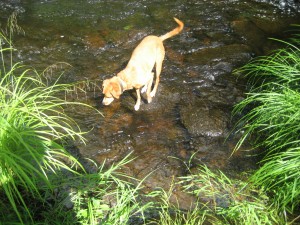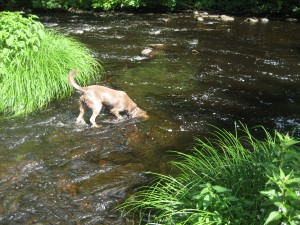
I’ll take a frog, please!

Being in water is not something that Grace is fond of. But she’s on the hunt for a frog and this would motivate her much more than a piece of cheese, one of her favorite treats, to get on the rocks as you see her here. It’s all a matter of what motivates us to do things we may not otherwise want to do!
At this morning’s Rotary meeting, our guest speaker was a dog trainer. It seems everywhere I turn these days I’m around some dog and/or animal-related activity, which makes me very happy. And I didn’t even have anything to do with arranging for the speaker!
Denise Mazzola gave a compelling presentation about a trip she made last fall, driving from Texas to New Hampshire in a small van, bringing back with her 22 homeless dogs. It was an amazing story and kudos to Denise for her extraordinary measures to save these precious animals and give them the opportunity to find permanent homes. (All were adopted!)
The impetus for this trip came as a result of Denise’s acceptance to an Extreme Mutt Makeover contest. The purpose of the event is to showcase shelter dogs – raising awareness that shelter dogs can be healthy, well-adjusted pets, and reducing any perception that these animals all have behavioral issues or insurmountable problems.
As part of this event, certified dog trainers spend eight weeks with a dog, teaching them basic obedience skills and preparing them for life with an adopted family. Denise was paired with Mustang Sally, a Catahula Leapard mix; Denise said that Sally was one of the most difficult dogs she had ever trained. Coming from a veteran trainer, that’s quite a statement.
If you only have a short period of time to show measurable results, you need to find strong motivators. Denise really needed to get to know Sally—fast—and understand what motivates her to success. Because Sally was not overly motivated by food, something that makes training easier, Denise had a harder job. And as she told us this morning, “It’s all about the motivation when you’re trying to change behavior.”
So of course, that got me thinking. That’s such a true statement for any person. Whenever we do something, we’re motivated by some reason. And if the task or behavior is less desirable for us, we need a more intense motivator. Wouldn’t you agree?
In the workplace, managers and executives are often trying to find ways to motivate employees to top performance. Or sometimes we just want to give a gift that says, “thank you for an outstanding job.” Frequently we offer the other person something that we value, as opposed to finding out what’s important to the other person. One common example is when sales organizations give incentive trips to exotic destinations for exceptional sales results. Even though many salespeople are social by nature it doesn’t automatically mean they want to go on a trip to the islands with their boss!
So when we are setting up benefits, incentives, rewards, and even simple gifts to say ‘thank you for a great job’, remember to think about the other person. The most important thing is what motivates that person. Not you. Involve the other individual in the conversation or you will likely miss the opportunity to find the real incentive.
Grace, unlike Mustang Sally, is very motivated by food. But if I am interested to get Grace to dip her toes in the water, the only thing that will entice her is a frog. Not even cheese, one of her favorite treats, would be enough. Get to know the other person so you’ll know what motivates them. Or if you can, ask.


